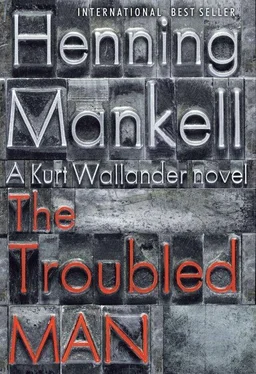“What I’m about to say now is nothing I could swear to,” he said. “It could be my imagination, my memory playing tricks. But now that I think about it, when Håkan was away she often talked on the phone, always with the door closed. She didn’t do that when he was at home.”
“Didn’t talk on the phone or didn’t close the door?”
“Neither.”
“Go on.”
“There were often papers lying around that she worked on. I have the feeling that when Håkan came home the papers were no longer there — there were flowers on the tables instead.”
“What kind of papers?”
“I don’t know. But sometimes there were drawings as well.”
Wallander gave a start.
“Drawings of what?”
“Divers. My mother was very good at drawing.”
“Divers?”
“Various dives, different phases of individual dives. ‘German leap with full twist’ or whatever they say, that sort of thing.”
“Can you remember any other kind of drawings?”
“She sometimes drew me. I don’t know where those drawings are, but they were good.”
Wallander broke a Danish pastry in two and dunked one half in his coffee. He looked at his watch. The musician under his feet was still playing his silent music.
“I’m not quite finished yet,” said Wallander. “Let’s talk about your mother’s views. Political, social, economic. What did she think about Sweden?”
“Politics were not a topic of conversation in my home.”
“Never?”
“One of them might say, ‘The Swedish armed forces are no longer capable of defending our country’ or something of the sort. The other might reply to the effect that it was the fault of the Communists. And that would be it. Either of them could have said either of those things. They were conservative, of course — we’ve spoken about that already. There was no question of voting for any party other than the Moderates. Taxes were too high. Sweden was allowing in too many immigrants who went on to cause chaos in the streets. I think you could say they thought exactly as you would expect them to.”
“There was never any exception to that, then?”
“Never, not that I can recall.”
Wallander nodded and ate the other half of the Danish.
“Let’s talk about your parents’ relationship with each other,” he said when he’d finished chewing. “What was that like?”
“It was good.”
“Did they ever argue?”
“No. I think they really loved each other. That’s something I thought about afterward — that as a child I never had the slightest fear that they would divorce. That thought never even occurred to me.”
“But surely no couple ever lives together without the occasional conflict?”
“They did. Unless they argued when I was asleep and I didn’t hear them. But I find that hard to believe.”
Wallander had no more questions. But he wasn’t ready to give up.
“Is there anything else you could say about your mother? She was kind and she was secretive, perhaps mysterious, we know that now. But to be perfectly honest, you seem to know surprisingly little about her.”
“I’ve come to see that,” said Hans, with something that Wallander interpreted as painful honesty. “There were hardly ever any moments of real intimacy between us. She always kept me at a certain distance. She comforted me if I hurt myself, of course. But with hindsight I can see now that she found that almost troublesome.”
“Was there any other man in her life?”
That was not a question Wallander had prepared in advance. But now that he’d asked it, it seemed an obvious one.
“Never. I don’t think there was any disloyalty between my parents. On either side.”
“What about before they got married? What do you know about that time?”
“I have the feeling that because they met so early in their lives, neither of them ever had anybody else. Not anyone serious. But of course, I can’t be certain.”
Wallander put his notebook in his jacket pocket. He hadn’t written down a single word. There was nothing to write. He knew as little now as he had before he’d arrived.
He stood up. But Hans remained seated.
“My father,” he said. “I gather he’s called you. So he’s alive, but he doesn’t want to put in an appearance, is that it?”
Wallander sat down again. The guitar player under his feet had moved on.
“There’s no doubt that he was the one who called. He said he was well. He gave no explanation of his behavior. He just wanted you to know that he was alive.”
“He really said nothing about where he was?”
“Nothing.”
“What impression did you get? Was he far away? Did he call from a landline or a cell phone?”
“I can’t say.”
“Because you don’t want to, or because you can’t?”
“Because I can’t.”
Wallander stood up again. They left the room made of glass. When they passed by the conference room, the door was closed but the people inside were still arguing loudly. They said their good-byes in reception.
“Did I help at all?” Hans asked.
“You were honest,” Wallander said. “That’s the only thing I can ask for.”
“A diplomatic answer. So I wasn’t able to give you what you were hoping for.”
Wallander made a resigned gesture. The glass door opened, and he waved as he left. The elevator took him silently down to the lobby. He had parked his car in a side street off Kongens Nytorv. Since it was very hot, he took off his jacket and unbuttoned his shirt.
Suddenly he had the feeling he was being watched. He turned around. The street was full of people, but he didn’t recognize any of the faces. After a hundred yards he stopped in front of a shopwindow and contemplated some expensive ladies’ shoes. He sneaked a look back along the section of street he’d just come from. A man was standing, looking at his wristwatch. Then he moved his overcoat from his right arm to his left . Wallander thought he remembered him from the first time he’d looked around. He turned back to the ladies’ shoes. The man passed behind his back. Wallander recalled something Rydberg had said. You don’t always need to be behind the person you’re shadowing. You can just as well be in front of him . Wallander set off and counted a hundred steps. Then he stopped again and turned around. Now there was nobody who attracted his attention. The man with the overcoat had vanished. When Wallander reached his car he looked around one last time. The people he could see, coming and going, were totally new to him. He shook his head. He must have been imagining things.
He drove back over the long bridge, paused at the Father’s Hat roadside café, then headed for home.
When he got out of the car, his mind suddenly went blank. He stood there with the keys in his hand, totally confused. The hood was warm. Once again he was panic-stricken. Where had he been? Jussi was barking and jumping up and down in his kennel. Wallander stared at the dog and tried hard to remember. He looked at the car keys, then at the car, hoping they would give him a clue. Almost ten horrifying minutes passed before the blockage crumbled and he remembered what he had been doing. He was drenched in sweat. It’s getting worse, he thought. I have to find out what’s happening to me.
He collected the mail and sat down at the garden table. He was still shaken by the attack of forgetfulness.
It was only later, after he had fed Jussi, that he discovered the letter lying among the newspapers he had collected from the mailbox. There was no return address, and he didn’t recognize the handwriting.
When he opened the letter he saw that it was handwritten, and from Håkan von Enke.
Читать дальше












